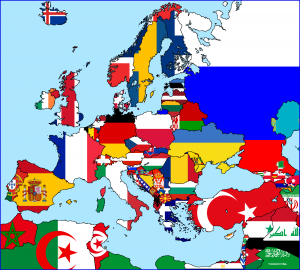Conference at the Institute of Cultural Diplomacy Will Europe finally speak with one voice? How should Europe respond to the rise of new powers such as India, China or Brazil? Should Europe expand further? How did the Lisbon Treaty changed the way the EU foreign policy works? Those are the questions that will shape the attitude of Europe toward the rest of the world in the 21st century. They were discussed during a conference organized by The Institute of Cultural Diplomacy in Berlin, an NGO that organizes conferences and seminars about current issues addressed mainly to a young and ambitious public. It introduced a panel of experts in that field to discuss a wide range a subject. The conferences was organized such as the participants had the opportunity to exchange and network. About 60 of them mainly from Europe came. The city of Berlin gave an excellent historical framework to this conference. I would like to present three of the topic covered by the conference as an opportunity for Citizens of Europe to learn more about the content and the framework of this conference.

The Treaty of Lisbon by G. Sabathil of the European Comission One of the main purposes of the Lisbon Treaty was to create a European Foreign Policy. It merged the High Representative of the Council with the Commissioner for Foreign Affairs. It created the External Action Service with 1900 diplomats from the Commission, Council and national agencies. Facing ever-accelerating changes around the world: from failed states to climate, energy, etc. The action service wants to promote the European values such as democracy or the rule of law, secure mutual assistance between countries and coordinating European defense agencies.
EU and Turkey by Former Foreign Minister of Turkey, H.E. Yasar Yakis and panel dicussion with Former Head of Culture of the Swedish Foreign Ministry K. Norrman, Former German Permanent Representative to the EU D. von Kyaw and Chied Editor of Euractiv, E. König. The Turkey’s negotiation with the EU started with the association agreement signed in 1963, although it wasn’t very active until 1995 when Turkey decided to sign a custom union with the EU which linked its economy strongly to the European economy. It became an official candidate in 1999. Important reforms brought Turkey closer in term of legislation but issues such as the Cyprus dispute are still in the way of the accession of Turkey to the EU. Mr. Yakis illustrated some of the different points of view between Turkey and the EU. The accusation that the Turkish people are losing the will to join the EU can be turned into an other way: if the EU don’t give a clear sign that Turkey is welcomed in the EU, the support for the EU in the Turkish population will narrow. Mr. Yakis reminded the Turkey did not necessarily need the EU as it is a major country on a geopolitical crossroad. Mr. Yakis also addresses the question of the Armenian genocide of 1915 explaining the historical massacres that occurred during this period and called for a joined team of historians to work on the issue and decide if that can be called genocide. Such a proposition has been made but wasn’t accepted by the Armenian side. The cohesion in the EU was seen as an important factor according to Mr. von Kyaw, especially considering the problem of integration of muslim minorities in Europe. The main argument in favor of its integration was the geopolitical position and the strong and dynamic economy it has.
Germany and the EU by D. van Kyaw As Germany was a latecomer in the history of European nations it came out quite isolated. After two devastating world wars, the European nations decided to associate Germany instead of occupy it, as it was the case after World War I. Considering its role during World War 2, Germany kept a low profile on the international stage and strongly supported the EU integration. It eventually became the center of Europe after the fall of the Berlin wall and finally the motor of the EU economic development. This brought Germany into a position of leadership it did not look for. This leadership is obvious in the current Euro crisis where its financial contribution is crucial to the stability of the Euro. Mr. van Kyaw insisted on the point that it is of German interests to help its European neighbor to improve their financial situation. However, he refused the idea of Eurobonds, arguing that in a first time, it would limit the incitation to conduct good policies.
